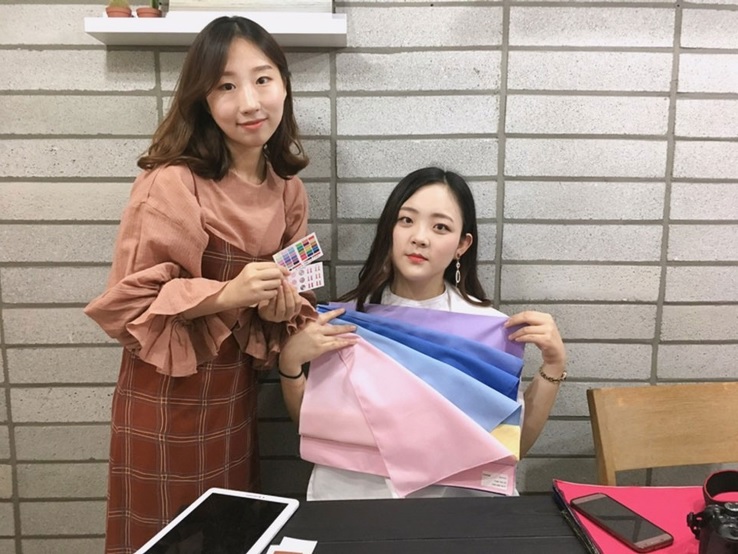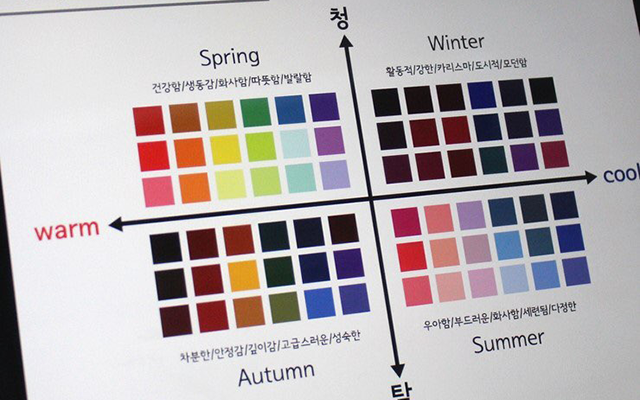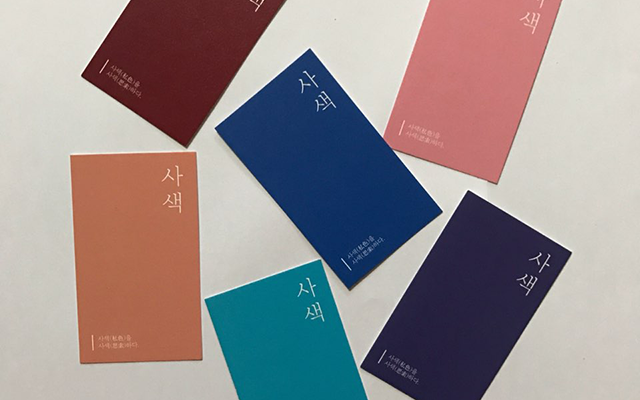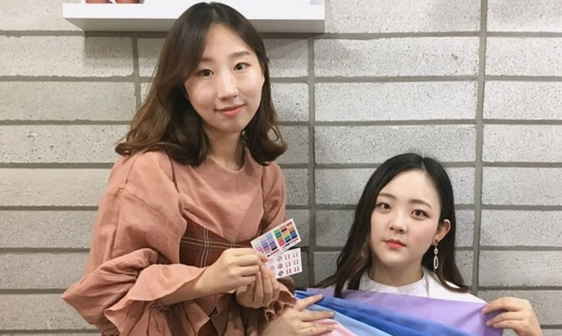- Show Your True Colors with the Help of Yonsei Students December 11, 2018
-
The story of personal color consultation startup SASEC

Personal style is something everyone has and it is a great way to express yourself, and clothes and makeup are the most popular medium for both men and women. During your journey for the perfect look, you may ask yourself: What color clothes do I look good in? What hair color looks best on me? What color concealer to use?
Realizing the demand to know yourself and your natural beauty, a Yonsei undergraduate has debuted in the competitive startup world with flying colors.
Yonsei student Sol-mi Lee (entering class of ’16, French Language and Literature) is CEO of SASEC, a personal color analysis startup which has sparked interest online and offline for its affordable, well-organized services.
Briefly introduce yourself.
My name is Sol-mi Lee and I am CEO of color analysis startup SASEC. Our group of six staff members oversees general planning & marketing, operations, development, and color consulting. As the double meaning of SASEC in Korean means “personal color" and “deep thought,” we provide 1:1 personal color consultation services.
What is personal color?
The dictionary definition of personal color is “a color which is in harmony with one’s features and makes one’s face appear bright and refreshed.” To put it simply, we can say it is a color that looks good on you. Since everyone’s complexion and features (e.g. skin complexion, eye color, lip color, hair color) vary, different colors look good on different people. The certain color of cosmetics or clothes may draw attention to someone’s dark circles and wrinkles, but the same color may draw out another person’s natural beauty. Here we can see that every individual has a different personal color which complements his or her features.
 SASEC seasonal color board
SASEC seasonal color boardHow did you first start SASEC?
After I got interested in startups and decided I want to learn more, I joined VERY – a startup student club at Yonsei University. For the spring festival, VERY launched a short-term money-making project in which we had to gain as much profit as we can with starting funds of only 50,000 won (about 45 USD).
I was interested in beauty YouTubers and makeup, and often watched video clips on personal color analysis. Naturally, I had wanted to receive a personal consultation myself, but I thought it was too expensive (prices starting at 80,000 won/70 USD) for college students. I also had many friends interested in finding their personal color but couldn’t use such services because of the high cost.
So for the festival project we formed a team called Color Special Forces and developed a reasonably priced service for personal color analysis. It was our first time planning and developing our service product and we were very inexperienced. Fortunately, popular cosmetic and beauty companies like Etude House, Aritaum, and Way Wearable sponsored our project with cosmetics and skin diagnosis devices.
Reception on the day of the festival as well as on social media was amazing; the surprisingly long line in front of our booth made us realize that the demand for personal color consultation was much higher than expected. It was a wonderful experience. Consumer feedback was so good every time we did the project that we decided to turn it into a new business.
What services do you provide? What gives you a competitive edge?
Currently, we provide offline personal color consultations and also recommend lip products via our online app. Recommendations are based on the color analysis results. With our services, customers can learn more about their seasonal colors and find out their best and worst tones. We also offer advice on makeup, fashion and hair color. Starting this month, we are also launching a program which allows clients to get their makeup done by a professional makeup artist as well as a cosmetics tour program for international exchange students and tourists.
The biggest advantage of SASEC is that we provide services which are systematic and at a reasonable price. What sets us apart is that when performing personal color analysis, we use a customized algorithm which helps exclude the subjectivity of the consultant and performs an objective and systematic analysis. By using colored drapes to develop the algorithm, we were able to reduce the required analysis time and provide an inexpensive service. Another advantage of SASEC is our online service which lists recommended lipstick colors, making it easier for clients to check their analysis results through their mobile phone while makeup shopping.
We are currently developing a new online feature which allows customers to receive a color analysis consultation online without the need of a personal visit. We hope this convenient option will increase our competitiveness.
What were the challenges of starting a company as an undergraduate?
Nowadays, there are many startup opportunities available to university students. Nowadays, the interest level among students is quite high and it is much easier to find people who are willing to participate. There are many support resources available to young people and since many universities have startup support centers, it has become easier to get funding and resolve business-related issues. In our case, it was easy for us to solve problems such as funding and office space with the support we received from Yonsei Enterprise Support Foundation when our team was selected for its entrepreneurship support program.

Tell us more about your current work.
With the support of the Yonsei Enterprise Support Organization, Soongsil University Global Enterprise Club and Duksung Women’s University Smart Venture center, we launched our application and consultation service last May. We have provided services to nearly 500 clients since our first beta tests.
These year, SASEC was selected as a “Maker Culture Startup of 2018” by the Korea Foundation for the Advancement of Science and Creativity and we are now focusing on developing prototypes for our online analysis service. Our goal is to complete the prototypes and run final verification tests by the end of the year. Once we expand our offline consultation services, develop our online service prototype and install consumer verification, we plan to focus on attracting investments and crowdfunding. We are also looking for new team members to help with the development of our online and offline services.
What is the ultimate goal for SASEC?
Our goal is to accumulating big data of consumers’ skin characteristics and implement artificial intelligence into our curation system as well as developing customized fashion, makeup and hair products based on this data. Therefore, we are continuously developing our online platform to collect big data. In the end, we hope that anyone and everyone will be able to express their individuality and charm by finding their personal color without the burden of high costs and inaccessibility.
As someone with experience in startups and as an undergraduate at Yonsei University, do you have any words of advice for fellow students dreaming of starting a business?
I’m sure many students reading this interview had thought at least once, “Hmm, what if I tried developing such a product?” or “It would be great if there was something that could solve this problem?” Only up until two years ago, I also had these vague ideas!
I’m not a hugely successful young CEO yet, but as the head of a small startup, I can say that the reason I was able to come as far as I have is that I didn’t stop at just thinking about such ideas but tried to make them a reality. I was also clueless in the beginning, having only vague dreams of launching a start-up and not knowing where and how to start. But I didn’t want to give up just because I knew nothing, so I thought, “Let’s just try anything!” So, I took startup courses and decided to enter join Yonsei’s startup student club. A year after I entered the club, my dream of the startup had come true.
It may seem obvious, but the hardest part is turning your dream into reality. Students dreaming of starting a business probably have many fears and challenges as I had. But if you really want to launch your start-up or develop your dream product; I advise you to just give it a try. Just like me, you can join a startup club and form a team with friends who share your dreams.
show mobile menu
mobile menu




